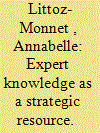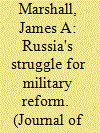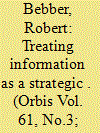|
|
|
Sort Order |
|
|
|
Items / Page
|
|
|
|
|
|
|
| Srl | Item |
| 1 |
ID:
157355


|
|
|
|
|
| Summary/Abstract |
This article asks how international secretariats can sometimes expand their authority in areas that relate neither to their mandate, nor to their sphere of expert authority. Existing explanations of mission creep assume that IOs act autonomously and expand in those areas that connect with their mandates, sense of organizational mission, and sphere of expert authority. The claim here is that entrepreneurial bureaucrats can succeed—in the absence of policy deadlock among states—in creating creep in unexpected issue domains through the mobilization of external expertise. The article examines this dynamic in the domain of bioethical standards. It shows that UNESCO acted as a first mover in the field, despite having no relevant expertise, and despite bioethics being more closely connected to the mandate of other organizations. Entrepreneurial bureaucrats within UNESCO were able to create creep in bioethics by mobilizing external experts in the field and capturing their skills. Working with external experts endowed their organization with the capacity to act, gave epistemic authority to their actions, and prevented the politicization of debates in a potentially controversial issue domain. In pointing to the strategic uses of expertise, the article challenges the commonly held view that expert knowledge acts as a means of solving problems and rationalizing global governance.
|
|
|
|
|
|
|
|
|
|
|
|
|
|
|
|
| 2 |
ID:
132446


|
|
|
|
|
| Publication |
2014.
|
| Summary/Abstract |
This article assesses the recent attempts to reform the Russian military and the future prospects of successful reform. Despite serious social and economic ailments, Russia should still be able to modernize its military; however the key obstacles to reform lie in its leadership's inability to shape existing resources into military capabilities. First, the article examines the decay in Russia's manpower, defense budgeting, and defense industrial base. Second, the article surveys the security environment in which Russia must tailor these strategic resources. However, the state of these resources and Russia's security needs do not justify the capabilities that the Russian military has developed. Therefore, the article identifies Russia's inability to transform resources into capabilities as the missing link in military reform. Specifically, these poor 'conversion capabilities' include dysfunctional civil-military relations, misguided threat assessment and strategy formulation, and opaque doctrine. Finally, the article concludes that absent any external existential threats or a military disaster, successful military reform is unlikely, with implications for both the threshold at which Russia decides nuclear weapons are necessary as well as its perceived need for strategic depth.
|
|
|
|
|
|
|
|
|
|
|
|
|
|
|
|
| 3 |
ID:
155279


|
|
|
|
|
| Summary/Abstract |
The United States is challenged by adversaries who seek to alter fundamentally the systemic balance of power through information-based strategies. These strategies leverage both legal and illegal operations to gain influence and control over key industries and information resource domains to constrain American freedom of action. It is a larger geoeconomic and geoinformational campaign by adversaries to harvest information in support of military, diplomatic, economic, and global political goals. To respond, the U.S. government must understand that information is a strategic resource. An American response might be to erode its competitors’ economic and informational advantages, attack their dependencies on other strategic resources, and exploit their information control systems. Cyberspace operations may provide some competitive advantage, but first they must be employed effectively. This effectiveness requires overcoming debilitating intellectual constraints and adopting new operational models.
|
|
|
|
|
|
|
|
|
|
|
|
|
|
|
|
|
|
|
|
|